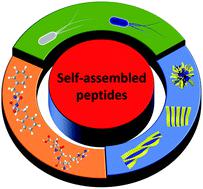当前位置:
X-MOL 学术
›
Biomater. Sci.
›
论文详情
Our official English website, www.x-mol.net, welcomes your
feedback! (Note: you will need to create a separate account there.)
Recent advances: peptides and self-assembled peptide-nanosystems for antimicrobial therapy and diagnosis.
Biomaterials Science ( IF 5.8 ) Pub Date : 2020-07-07 , DOI: 10.1039/d0bm00789g Pengfei Zou 1 , Wen-Ting Chen , Tongyi Sun , Yuanyuan Gao , Li-Li Li , Hao Wang
Biomaterials Science ( IF 5.8 ) Pub Date : 2020-07-07 , DOI: 10.1039/d0bm00789g Pengfei Zou 1 , Wen-Ting Chen , Tongyi Sun , Yuanyuan Gao , Li-Li Li , Hao Wang
Affiliation

|
Bacterial infections, especially the refractory treatment of drug-resistant bacteria, are one of the greatest threats to human health. During the past decades, biomedical nanomaterials have been developed in an increasing number of fields, which significantly contribute to our public healthcare systems. Peptide-based drugs, such as antimicrobial peptides, cyclopeptides, and glycopeptides, play important roles in the treatment of drug-resistant bacterial infections, due to their unique lower resistance antibacterial mechanism. Among them, biomimetic nanostructures fabricated by self-assembled peptide nanomaterials have received considerable development in surface protection, tissue engineering, bactericides, etc. Besides, bacterial diagnostic reagents based on self-assembled peptide materials also provide strong support for early detection and infection imaging of bacterial infections. In this review, we have systematically discussed peptide-based self-assembled nanomaterials, including their sequences, subunits, secondary structures, assembled nanostructures, and biomedical applications for antibacterial therapy and diagnosis. We have reviewed and discussed the structure–function relationship, molecular design strategy, and structure effect of antimicrobial peptides. The sequence design of self-assembled peptides and the application of self-assembled peptide nanomaterials in the diagnosis and treatment of bacterial infections are emphasized. Also, we analyzed and summarized the design and development of smart materials, reviewed the innovative “in vivo self-assembly” nanotechnology, and proposed the future design and prospect of smart self-assembly nanomaterials based on peptides in the biological antibacterial field.
中文翻译:

最新进展:用于抗菌治疗和诊断的肽和自组装肽纳米系统。
细菌感染,尤其是耐药菌的难治性治疗,是对人类健康的最大威胁之一。在过去的几十年中,生物医学纳米材料已经在越来越多的领域中得到了发展,这极大地促进了我们的公共医疗体系。基于肽的药物,例如抗菌肽,环肽和糖肽,由于其独特的低耐药性抗菌机制,在耐药细菌感染的治疗中起着重要作用。其中,由自组装肽纳米材料制成的仿生纳米结构在表面保护,组织工程,杀菌剂等方面取得了长足的发展。。此外,基于自组装肽材料的细菌诊断试剂也为细菌感染的早期检测和感染成像提供了有力的支持。在这篇综述中,我们系统地讨论了基于肽的自组装纳米材料,包括其序列,亚基,二级结构,组装的纳米结构以及用于抗菌治疗和诊断的生物医学应用。我们已经审查并讨论了抗菌肽的结构-功能关系,分子设计策略和结构效果。强调了自组装肽的序列设计和自组装肽纳米材料在细菌感染的诊断和治疗中的应用。此外,我们分析并总结了智能材料的设计和开发,回顾了创新的“体内自组装”纳米技术,并提出了在生物抗菌领域中基于肽的智能自组装纳米材料的未来设计和前景。
更新日期:2020-09-15
中文翻译:

最新进展:用于抗菌治疗和诊断的肽和自组装肽纳米系统。
细菌感染,尤其是耐药菌的难治性治疗,是对人类健康的最大威胁之一。在过去的几十年中,生物医学纳米材料已经在越来越多的领域中得到了发展,这极大地促进了我们的公共医疗体系。基于肽的药物,例如抗菌肽,环肽和糖肽,由于其独特的低耐药性抗菌机制,在耐药细菌感染的治疗中起着重要作用。其中,由自组装肽纳米材料制成的仿生纳米结构在表面保护,组织工程,杀菌剂等方面取得了长足的发展。。此外,基于自组装肽材料的细菌诊断试剂也为细菌感染的早期检测和感染成像提供了有力的支持。在这篇综述中,我们系统地讨论了基于肽的自组装纳米材料,包括其序列,亚基,二级结构,组装的纳米结构以及用于抗菌治疗和诊断的生物医学应用。我们已经审查并讨论了抗菌肽的结构-功能关系,分子设计策略和结构效果。强调了自组装肽的序列设计和自组装肽纳米材料在细菌感染的诊断和治疗中的应用。此外,我们分析并总结了智能材料的设计和开发,回顾了创新的“体内自组装”纳米技术,并提出了在生物抗菌领域中基于肽的智能自组装纳米材料的未来设计和前景。











































 京公网安备 11010802027423号
京公网安备 11010802027423号